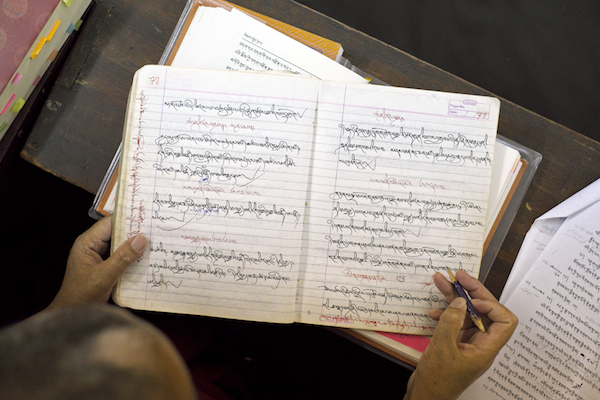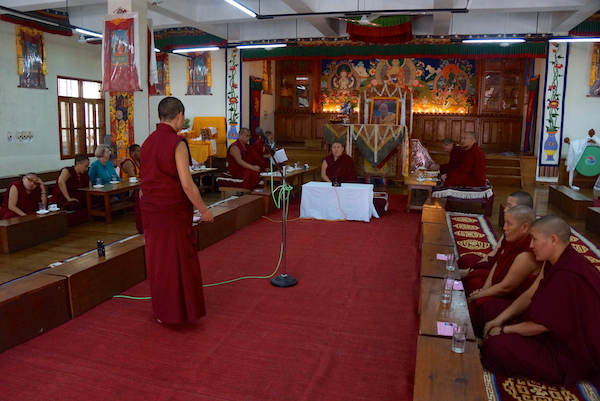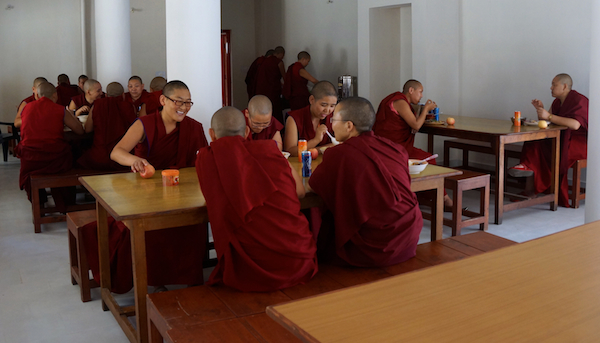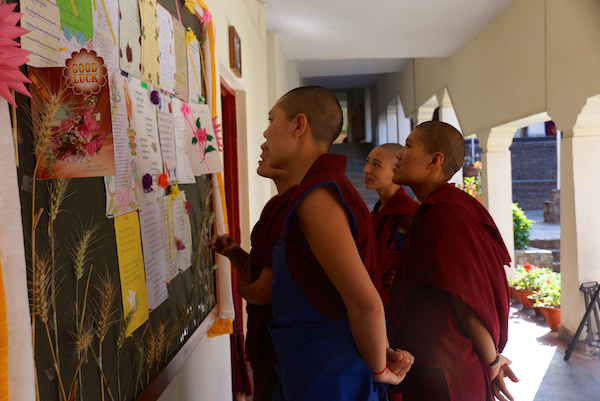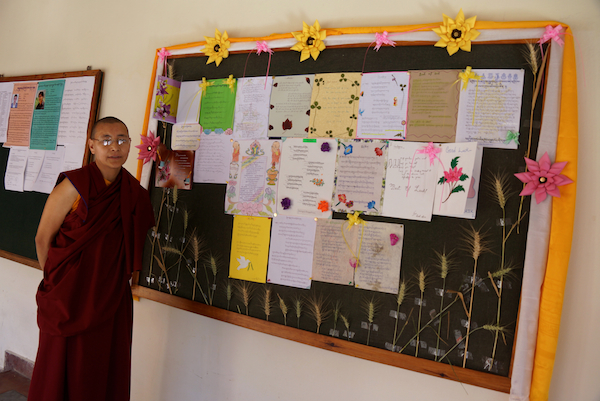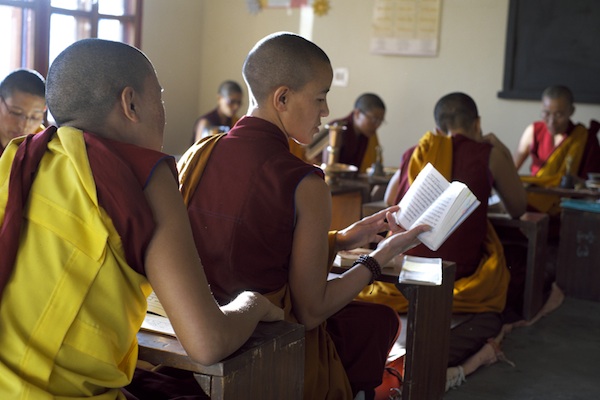Last month we reached out to our global family of supporters to let you know about nuns working hard to become Geshemas. So many of you wrote to share beautiful good luck messages for the Geshema candidates.
We compiled all your good luck messages and they were posted on the noticeboard at Dolma Ling Nunnery. Our wonderful Nuns’ Media Team documented the nuns reading the messages and also the start of the 2018 Geshema exams.
We’d like to share some of the photos and some of your good wishes here, taking you on an armchair trip to the heart of Dolma Ling Nunnery.
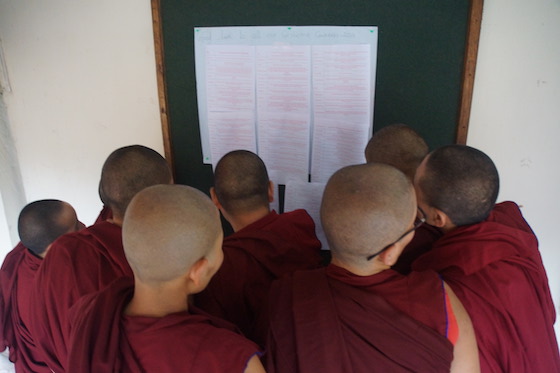
Nuns gather at the Dolma Ling Nunnery bulletin board to read the many messages of good luck sent to the Geshema candidates. Photo by the Nuns’ Media Team.
In August 2018, 44 Tibetan Buddhist nuns are sitting various levels of the rigorous four-year Geshema exams. (Earlier we reported that there were 46 nuns, but one of the nuns taking first-year exams had to postpone and return home to care for her ailing mother, and one of the second-year nuns also had to miss exams this year) The written and oral (debate) exams run from August 15-26, 2018.
- 12 nuns taking their first round of examinations
- 14 nuns doing their second-year exams
- 8 nuns doing their third-year exams and
- 10 nuns doing their fourth and final year.
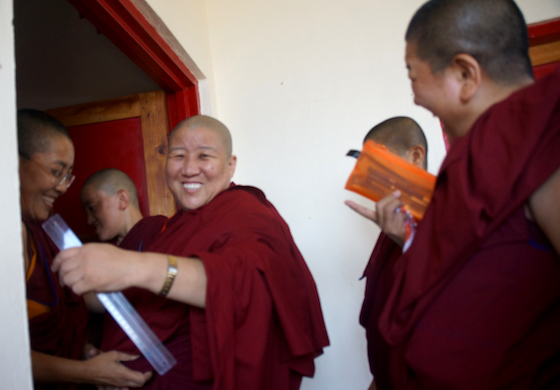
A smiling Tibetan Buddhist nun enters her Geshema exams equipped with ruler and pens. The written and oral exams last two weeks and are based on 17 years of study. Photo by the Nuns’ Media Team.
The Geshema degree (or Geshe degree for monks) is roughly equivalent to a PhD in Tibetan Buddhism. This highest degree was, until recently, only open to men. Now Tibetan Buddhist nuns are making history. In the last two years, 26 Tibetan Buddhist nuns have earned this degree.
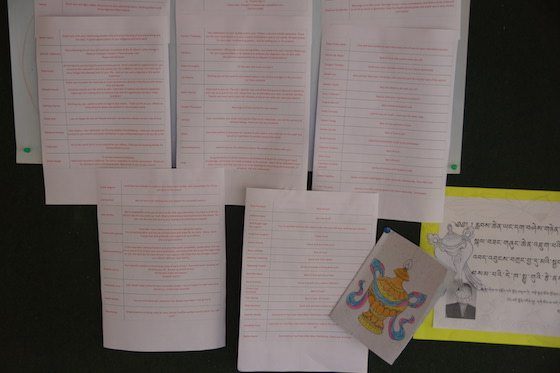
Supporters from around the world sent heartfelt messages of good luck to the nuns taking this year’s Geshema exams. The messages were posted on the bulletin board at Dolma Ling Nunnery for all the nuns to see. Photo by the Nuns’ Media Team.
Here are some of the messages:
“Congratulations to all the Geshema candidates at all levels for achieving so much knowledge, previously not made available to the women. May it all be reflected in your exam results, and may you carry on to be blessings to every being you encounter, in whatever role and relationship.” Poke
“Your dedication to your studies and to your Tibetan culture is simply awesome. Thank you for your contributions to your branch of Buddhism and to our world. All best wishes for your soon forthcoming exams. I will be holding you in my prayers.” Carolyn
“Blessings to all the nuns! Homage to your vows, compassion and desire to be of benefit to all of us stuck in ignorance. May the Bodhisattvas guide and assist you in your studies and exams.” Stephen
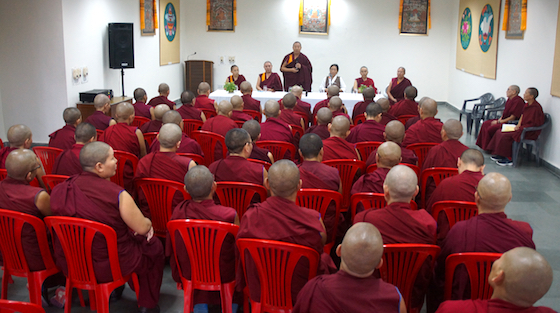
Introductory remarks and good wishes before the 46 nuns start taking their two weeks of Geshema exams. Photo by the Nuns’ Media Team.
In the spring of 2018, we launched a special fund for the 2018 Geshema Exams. We are extremely grateful to all the donors who made gifts to this fund which is being used to cover the costs of travel for the nuns to and from their exams and for the food during their month-long stay at Dolma Ling.
We’d like to say a special thank you to Vita Wells who made a major gift to this fund in memory of her late partner, Michelle Bertho. We would also like to send a special thank you to Dechen Tsering for launching a birthday campaign for this fund and to her many friends and family who made gifts in her honor.
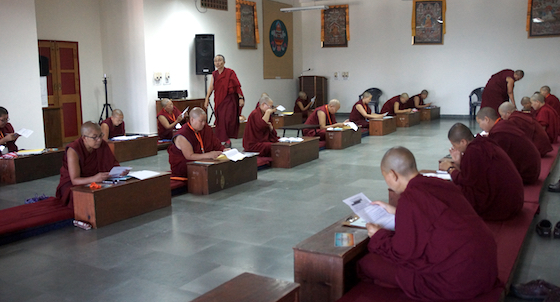
Each year, the two weeks of Geshema exams involve both written exams and oral (debate) exams. Nuns must complete 4 years of exams to earn their Geshema degree, equivalent to the Geshe degree for monks. Photo by the Nuns’ Media Team.
We are still seeking $2,035 to complete the funding for the 2018 Geshema exams. You can learn more and donate here.
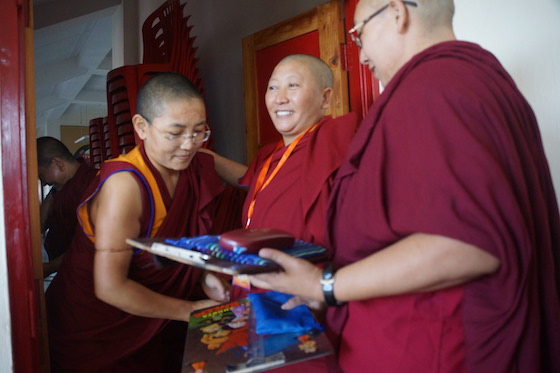
All prepared and entering the exam hall. Photo by the Nuns’ Media Team.
Here’s a few more good luck messages for the Geshema candidates:
“Hello to you from Canada! I wish all of you taking exams the very best of luck, but even more, the heartfelt wish for you to shine. It is very important for you, and for people around the world, that you are able to preserve and protect the precious teachings you have studied. May you all excel, and blessings radiate for all. Much metta to you.” Michelle
“To All the Geshema Candidates, You are an inspiration. Beings have already benefited from your study.and dedication. Thank you for your efforts. You help insure the survival of the Dharma. May you all successfully complete your exams. May the benefits of your accomplishments be universal.” Carole
“Sending best wishes to you all from the UK. You are an inspiration to all women who seek a better future, and the Buddha”s teaching is safe in your hands.” Julia
“As a PhD in science and a long-time supporter of TNP, I am delighted by the news and admire the perseverance of the nuns. May Buddhism long live!” Nathan
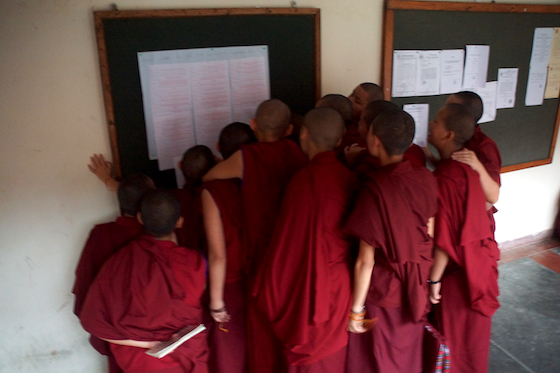
Nuns cluster around the noticeboard at Dolma Ling Nunnery to read the good luck messages for the Geshema candidates. The good wishes were felt by all the nuns. Photo by the Nuns’ Media Team.
The Geshemas are paving the way for other nuns to follow in their footsteps. This degree will make them eligible to assume various leadership roles in their monastic and lay communities reserved for degree holders and hence previously not open to women.
The 26 Geshemas who graduated in 2016 and 2017 are now taking part in a groundbreaking new Buddhist tantric studies program. This two-year program at Dolma Ling Nunnery started in November 2017 and is funded by generous supporters through the Tibetan Nuns Project.
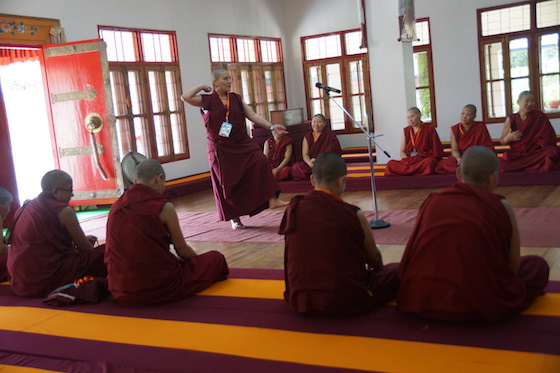
A nun debates as part of her Geshema exams. Providing opportunities for the nuns to debate has been a critical part of their education to reach this highest degree. The next major event for the nuns is the annual inter-nunnery debate, called the Jang Gonchoe, which will take place this year at Kopan Nunnery in Nepal.

